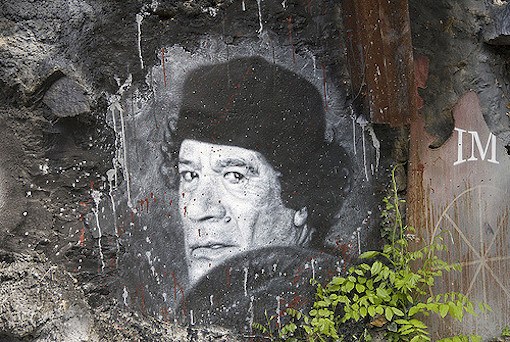On October 20, 2011, Libya’s Muammar al-Gaddafi was brutally murdered by a mob of NATO-backed ‘rebels’, after first being beaten and violated in the most barbaric fashion. History leaves no doubt that not only was the Libyan leader murdered on this day but Libya itself.
The regime-change crew who dominate Western governments have a long indictment sheet against their names. Since 9/11 they have wrought havoc and human misery on a grand scale in their determination to reshape and own a world that has never been theirs to own. Afghanistan, Iraq, Libya – Syria currently embroiled in a pitiless conflict for its survival as a secular, non-sectarian state – this is the miserable legacy of nations which speak the language of democracy while practising the politics of domination.
Of the aforementioned victims of Western imperialism, there is a strong argument to be made that Libya’s destruction constitutes an especially grievous crime. After all, in 2010, the year before it experienced its ‘revolution’, the United Nations Development Programme considered Libya a high development country in the Middle East and North Africa. In concrete terms this status translated to a literacy rate of 88.4%, a life expectancy of 74.5 years, gender equality, and various other positive indicators. In addition, Libya enjoyed 4.2% economic growth in 2010 and could boast of foreign assets in excess of $150 billion.
Compare this record to Libya in 2016. According to testimony provided by US Army General David Rodriguez to the US Senate Armed Services Committee in March, it is a failed state, with the general estimating it would take ‘“10 years or so” to achieve long-term stability in what is a “fractured society”’.
There is currently no single government or authority in Libya whose writ runs in the entire country. Instead three competing authorities control their own fiefdoms. The internationally recognized government is the Government of National Accord (GNC), led by Fayez al-Sarraj, is based in the capital, Tripoli. There is also the Government of National Salvation, led by Khalifa Ghwell, which is also based in Tripoli. The third centre of power, meanwhile, is located in Tobruk in the east of the country. It is headed by an anti-Islamist general, Khalifa Haftar, who leads the Libyan National Army (LNA). Economically, oil revenues, responsible for 90% of revenue under Gaddafi, have halved, violence is widespread, and since 2011 Daesh has managed to gain a foothold, though in recent months the terrorist organization has come under huge pressure in its stronghold of Sirte from forces representing the GNC.
The impact of the chaos that has engulfed the country since Gaddafi was overthrown and murdered can be measured by the flood of Libyans who have attempted the perilous journey across the Mediterranean with the objective of reaching Europe. In the process untold thousands have perished.
UN Security Council Resolution 1973, passed in March 2011, marked the end of the Arab Spring and the beginning of the Arab Winter. The mass and popular demonstrations that succeeded in toppling Tunisian dictator Ben Ali and is Egyptian counterpart Hosni Mubarak were not replicated in Libya. Instead, in Benghazi, where the anti-Gaddafi movement was centred, Islamists predominated. There was no nationwide mass movement in Libya, such as those that swept across Tunisia and Egypt, and no popular support for toppling a government and leader who presided over a society that enjoyed the highest standard of living of any in Africa.
Loyalist Gaddafi forces were defeated by NATO not the opposition forces emanating from Benghazi. Indeed it was at the point at which the country’s armed forces were approaching Benghazi, preparatory to crushing the uprising, when NATO intervened – based on the lie of protecting civilians when in truth it was intent on regime change.
Gaddafi’s crime in the eyes of the West was not that he was an authoritarian dictator – how could it be when their closet ally in the region is Saudi Arabia? His crime in their eyes, it was revealed in a tranche of classified Clinton emails, released by Wikileaks in January of this year, was his intention of establishing a gold-backed currency to compete with the euro and the dollar as an international reserve currency in Africa. In this regard the then French president, Nicolas Sarkozy, and then US secretary of state, Hillary Clinton, were key actors in pushing for NATO intervention. Libyan oil was also a factor.
The classified emails prove beyond any doubt that what took place in Libya was a monstrous crime for which those responsible have yet to be held accountable. On the contrary, Sarkozy is currently in the process of preparing a political return as French president, while Hillary Clinton is favorite to win the race for the White House against Republican nominee Donald Trump.
Of the two, it is Clinton who was filmed clapping her hands and laughing at the news of Muammar Gaddafi’s murder in 2011. It is Clinton who pressed for the military intervention that ended in Libya’s destruction. And it is Hillary Clinton who has the gall to present herself as a moral giant in comparison to her rival for the US presidency.
The Libyan people may well disagree.
